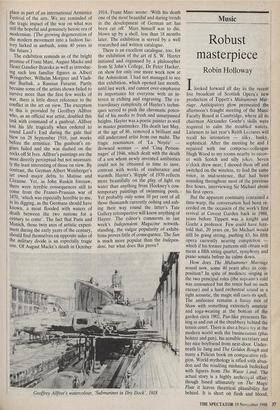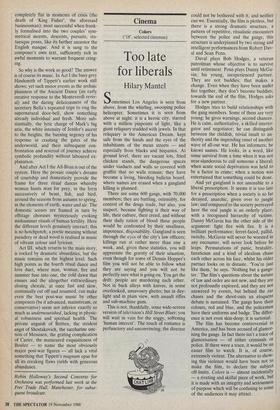Music
Robust masterpiece
Robin Holloway
Ilooked forward all day to the recent live broadcast of Scottish Opera's new production of Tippett's Midsummer Mar- riage. Anticipatory glow permeated the afternoon's fraught meeting of the Music Faculty Board at Cambridge, where all its chairman Alexander Goehr's skills were required to calm the troubled waters. Listeners to last year's Reith Lectures will recall his intonation — silky, husky, sophistical. After the meeting he and I repaired with our composer-colleague Hugh Wood to my rooms nearby to recov- er with Scotch and silly jokes. Seven o'clock drew near; I shooed them off and switched on the wireless, to find the same voice, in mid-sentence, that had been sounding throughout most of the previous five hours, interviewing Sir Michael about his first opera.
But the apparent continuity contained a time-warp; the conversation had been re- corded on the occasion of the work's first revival at Covent Garden back in 1968, years before Tippett was a knight and Goehr a professor. Few could have fore- told that, 20 years on, Sir Michael would still be going strong, pushing 83, his fifth opera currently nearing completion which if his former patterns still obtain will mean a fifth string quartet, symphony and piano sonata before he calms down.
How does The Midsummer Marriage sound now, some 40 years after its com- position? In spite of mediocre singing in the two principal roles (the soprano's cold was announced but the tenor had no such excuse) and a hard orchestral sound in a tight acoustic, the magic still casts its spell. The ambience remains a funny mix of Shaw with something extremely amateur and toga-wearing at the bottom of the garden circa 1902, Pan-like presences flit- ting in and out of the shrubbery behind the tennis court. There is also a brave try at the modern world with the businessman (plus holster and gun), his sensible secretary and her nice boyfriend from next-door. Under- neath lie Jung and The Golden Bough and many a Pelican book on comparative reli- gion. World mythology is rifled with aban- don and the resulting mishmash bedecked with figures from The Waste Land. The actual story is a highly archetypal affair; though based ultimately on The Magic Flute it leaves theatrical plausibility far behind. It is short on flesh and blood; completely flat in moments of crisis (the death of 'King Fisher', the aforesaid businessman); most successful when frank- ly formalised into the two couples' sym- metrical ascents, descents, pursuits, sta- tuesque poses, like its further ancestor the English masque. And it is sung to the composer's own text, sufficiently rich in awful moments to warrant frequent cring- ing.
So why is the work so good? The answer is of course its music. In Act I the busy grey Hindemith of Tippett's earlier work still shows; yet such minor events as the archaic plainness of the Ancient Dance' (an early creative response to the Monteverdi reviv- al) and the daring deliciousness of the secretary Bella's repeated trips to ring the supernatural door-bell, show something already individual and fresh. More sub- stantially, the lyric charge of Mark's big aria, the white intensity of Jenifer's ascent to the heights, the burning urgency of his response in crashing the gates of the underworld, and their subsequent con- frontation and reversal of journey achieve symbolic profundity without laboured ex- planation.
And after Act I the All-Bran is out of the system. Here the prosaic couple's dreams of courtship and domesticity provide the frame for three ritual dances whereby woman hunts man for prey, in the form successively of beast, fish, and bird, around the seasons from autumn to spring, in the elements of earth, water and air. The domestic scenes are framed in turn by offstage choruses mysteriously evoking midsummer rituals of human fertility. Here the different levels genuinely interact; this is no hotchpotch; a poetic meaning without pseudery or dead wood is realised in music of vibrant colour and lyricism.
Act III, which returns to the main story, is rocked by dramatic absurdities, but the music remains on the highest level. Such high points as the fourth ritual dance and love duet, where man, woman, fire and summer fuse into one, the cold dawn that ensues and the altogether extraordinary closing chorale, at once fast and slow, continually cut off and resumed, can make even the best post-war music by other composers (be it advanced, mainstream, or conservative) seem not inferior exactly so much as undernourished, lacking in physic- al robustness and spiritual health. The private anguish of Britten, the strident angst of Shostakovich, the saccharine unc- tion of Messiaen, the grating complication of Carter, the manicured exquisiteness of Boulez — to name the most obviously major post-war figures — all lack a vital something that Tippett's magnum opus for all its creaking flaws yields with generous abundance.
Robin Holloway's Second Concerto for Orchestra was performed last week at the Free Trade Hall, Manchester, for subse- quent broadcast.























































 Previous page
Previous page